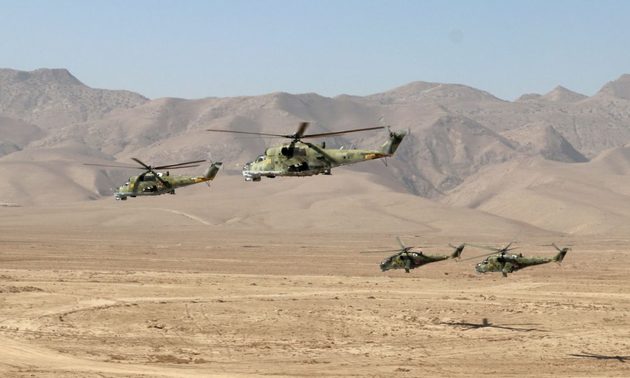Russia has announced it will hold joint air drills with Uzbekistan along the Central Asian nation's border with Afghanistan but has dismissed the notion that real airstrikes were being planned. As Newsweek reports, the Russian Defense Ministry stated Thursday that Su-25SM attack aircraft of the Central Military District's aviation fleet based in allied Kyrgyzstan were set to take part in joint Russian-Uzbek aerial exercises from July 30 to August 20. The ministry said that the "practical part of the training event will take place at the Termez training ground in the area bordering Afghanistan."
"During the exercise, Russian pilots will provide air support to the joint group of forces performing combat training tasks to preserve the territorial integrity of the states of the Central Asian region," the statement said. "Also, the crews of the Su-25SM will search for and destroy camouflaged bases of the imaginary enemy and work out techniques for getting out of the attacks of portable anti-aircraft missile systems."
Even as fears of instability in Afghanistan mount among regional players as rapid Taliban advances and an uptick in violence coincides with the U.S. military withdrawal, Moscow's top diplomat said no discussions were being held with respect to any military intervention.
"No one is talking about any targeted strikes on Afghanistan, and no one is even thinking about invading Afghanistan," Russian Foreign Minister Sergey Lavrov said during an interview Wednesday with the Interfax news outlet.
He said Russia's policy today was nothing like that of the United States, or even of the former Soviet Union, which fought a decade-long war of its own in Afghanistan in the 1980s, only to withdraw through Uzbekistan amid gains by local and foreign mujahideen forces that received assistance from Pakistan, Saudi Arabia and the U.S.
"You are confusing us with the Americans or the experience that we 'carried over' from the Soviet times," Lavrov said. "Our society strongly believes in the need to ensure the security of our borders and to create proper conditions for other countries' security to be ensured through their internal agreements based on national ideology."
These agreements include security commitments to Kyrgyzstan and fellow Central Asian nations Kazakhstan and Tajikistan under the Collective Security Treaty Organization, which also includes Armenia and Belarus as members. Uzbekistan too was a treaty state until 2012 when it left the bloc and banned all foreign military bases from the country.
But Uzbekistan, like other regional states, has raised concerns over a potentially worsening conflict in Afghanistan, where the Taliban has taken nearly all of the country's borders. With Washington also looking for potential inroads for establishing a military presence in Central Asia as U.S. troops leave Afghanistan, Moscow has intensified its engagement with the region.
"We have obligations to our allies—Tajikistan and Kyrgyzstan—which guide our actions in accordance with an article in the Collective Security Treaty," Lavrov said. "In the event of any aggression against any CSTO member, consultations will be held immediately to determine response measures in order to suppress the aggression."
The following day, as the joint Russian-Uzbek drills were announced, Russian Deputy Foreign Minister Andrey Rudenko received Uzbek ambassador to Russia Botirjon Asadov.
"A thorough exchange of views took place on topical topics of bilateral ties," the Russian Foreign Ministry said in a statement Thursday. "A high assessment was given to the development of Russian-Uzbek relations of strategic partnership and alliance. Particular attention is paid to the preparation of upcoming events at the highest and highest level."
Rudenko also gave an interview with the Russia Today television network on Thursday, in which he discussed the situation in Afghanistan and its potential effects on Central Asia.
"We cannot but be concerned about the exacerbation of the intra-Afghan conflict and its negative impact on the neighboring states of Central Asia," Rudenko said.
He praised Russia's relationships with both Uzbekistan and Tajikistan and said Moscow was prepared to provide assistance to both countries if needed. He also touted "a confidential dialogue with Turkmenistan"—the most elusive Central Asian state that borders Afghanistan and has a policy of neutrality in all foreign affairs—"in the field of security, within the framework of which representatives of the competent departments exchange assessments regarding common threats and challenges."
"The ongoing degradation of the situation in Afghanistan poses a direct threat to Central Asia," Rudenko said. "We share the corresponding concerns of our neighbors in the region."
And he blamed this degradation on Washington and its allies.
"The consequences of the hasty withdrawal of U.S. troops and a number of NATO countries from Afghanistan are becoming obvious," Rudenko said. "The country's once relatively calm northern provinces are rapidly turning into another hot spot."
While Russia has engaged diplomatically with the Taliban, officials have warned of other groups such as the Islamic State and Al-Qaeda taking advantage of instability in Afghanistan to establish a more robust presence of their own in the country.
Washington, for its part, has pleaded for the Afghan government and the Taliban to invest more heavily in their oft-stalled dialogue, a main feature of the peace deal reached last year between former President Donald Trump's administration and the Taliban.
Trump's successor, Joe Biden, delayed the initial withdrawal deadline initially set for May to September 11, the 20th anniversary of the 9/11 attack that first drew U.S. military intervention against Al-Qaeda and the Taliban in 2001, but has since set the total exit date for August 31.
"Our mission in Afghanistan is to complete this drawdown and to get to a point where our force presence is designed to protect our diplomats and our diplomatic mission," Pentagon spokesperson John Kirby told reporters Thursday. "That's our mission in Afghanistan."






